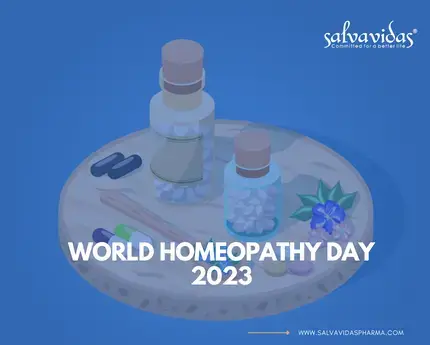
World Homeopathy Day
Introduction
Homeopathy is a holistic system of medicine that has been around for more than 200 years. It is based on the idea that the body has an innate ability to heal itself and that the role of the physician is to support this process. On World Homeopathy Day 2023, we celebrate this alternative approach to healthcare that has helped millions of people worldwide.
In this article, we will explore the history of homeopathy, how it works, and its current role in healthcare. We will also address common misconceptions about homeopathy and answer some frequently asked questions about this fascinating discipline.
The Origins of Homeopathy
Homeopathy was founded in the late 18th century by a German physician named Samuel Hahnemann. Hahnemann was dissatisfied with the medical practices of his time, which included bloodletting and the use of toxic substances such as mercury and arsenic.
In his search for a safer and more effective way to treat illness, Hahnemann began experimenting with dilutions of various substances. He found that small doses of certain substances could stimulate the body’s natural healing response and that this response was specific to each individual.
This concept of “like cures like” forms the basis of homeopathy. According to this principle, a substance that causes symptoms in a healthy person can be used to treat those same symptoms in a sick person.
How Homeopathy Works
Homeopathy is based on the idea that symptoms are the body’s way of trying to heal itself. By taking a homeopathic remedy that matches their symptoms, a person can support this natural healing process.
Homeopathic remedies are made from natural substances such as plants, minerals, and animal products. These substances are highly diluted and succussed (shaken vigorously) in a process called potentization.
The dilution process makes homeopathic remedies extremely safe and free from side effects. It also makes them highly effective, as the dilution and succussion process enhances the energetic properties of the substance.
Homeopathy is a highly individualized approach to healthcare. A homeopath will take into account a person’s physical, mental, and emotional symptoms when selecting a remedy. This means that two people with the same physical ailment may receive different remedies, depending on their unique symptoms.
The Role of Homeopathy in Healthcare Today
Homeopathy is becoming more popular as people search for safe, effective, and natural ways to treat illness. It is used to treat a wide range of conditions, from acute illnesses such as colds and flu to chronic conditions such as asthma and arthritis.
In some countries, homeopathy is integrated into mainstream healthcare. In India, for example, homeopathy is recognized as a separate system of medicine and is widely practiced alongside conventional medicine.
In other countries, homeopathy is considered complementary or alternative medicine. In these countries, people often turn to homeopathy when conventional medicine has been unable to provide relief or when they are looking for a gentler approach to healthcare.
Common Misconceptions About Homeopathy
Despite its popularity, homeopathy is often misunderstood. Here are some common misconceptions about homeopathy and the facts that dispel them:
- Homeopathy is just a placebo effect – While it is true that homeopathic remedies are highly diluted, they are still effective. Numerous studies have shown that homeopathy is more effective than a placebo in treating a wide range of conditions.
- Homeopathy is not scientific – Homeopathy is based on the principles of scientific research and has been studied extensively. While the mechanisms of action of homeopathic remedies are not fully understood, studies have shown that they can have a measurable effect on the body.
- Homeopathy is not regulated – In many countries, homeopathy is regulated by the government and homeopathic remedies must meet strict standards for safety and quality.
- Homeopathy can’t be used with conventional medicine – Homeopathy can be used alongside conventional medicine and is often integrated into mainstream healthcare in many countries.
FAQs
Q. Is homeopathy safe?
A. Yes, homeopathy is very safe. Because homeopathic remedies are highly diluted, they are free from side effects and toxicity.
Q. Can homeopathy be used for children?
A. Yes, homeopathy can be used for children of all ages. It is particularly useful for children as it is gentle, safe, and effective.
Q. How long does it take for homeopathy to work?
A. The length of time it takes for a homeopathic remedy to work depends on the individual and the condition being treated. In some cases, improvement can be seen immediately, while in other cases it may take several weeks or even months to see results.
Q. Can homeopathy be used for chronic conditions?
A. Yes, homeopathy can be used to treat chronic conditions. In fact, homeopathy is often very effective for chronic conditions such as asthma, arthritis, and digestive disorders.
Conclusion
On World Homeopathy Day 2023, we celebrate the power of homeopathy in healthcare. This holistic approach to medicine has been around for more than two centuries and is becoming increasingly popular as people search for safe, effective, and natural ways to treat illness.
Homeopathy is based on the principle of “like cures like” and uses highly diluted and succussed remedies to stimulate the body’s natural healing response. It is a highly individualized approach to healthcare, with remedies selected based on a person’s unique symptoms.
Despite common misconceptions, homeopathy is safe, and effective, and has been extensively studied. It can be used alongside conventional medicine and is particularly useful for children and chronic conditions.
As we celebrate World Homeopathy Day 2023, let us continue to explore and appreciate the benefits of this fascinating discipline in healthcare.
You May Also Like

Hydrocortisone Injection: Uses, Benefits, Side Effects, and More

API Manufacturing in India – Salvavidas Pharmaceutical


0